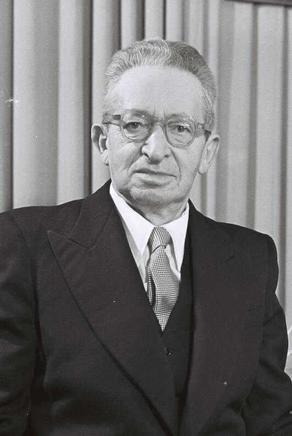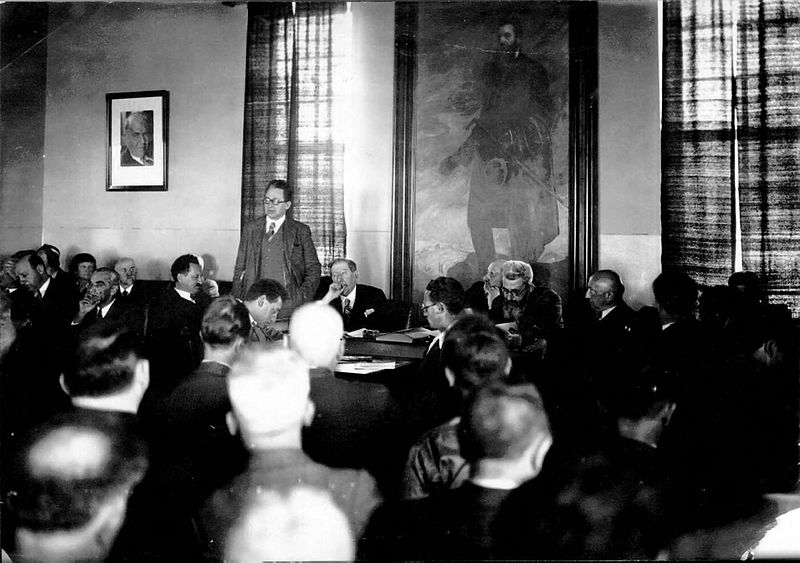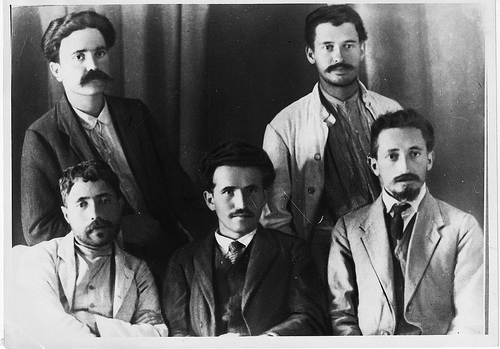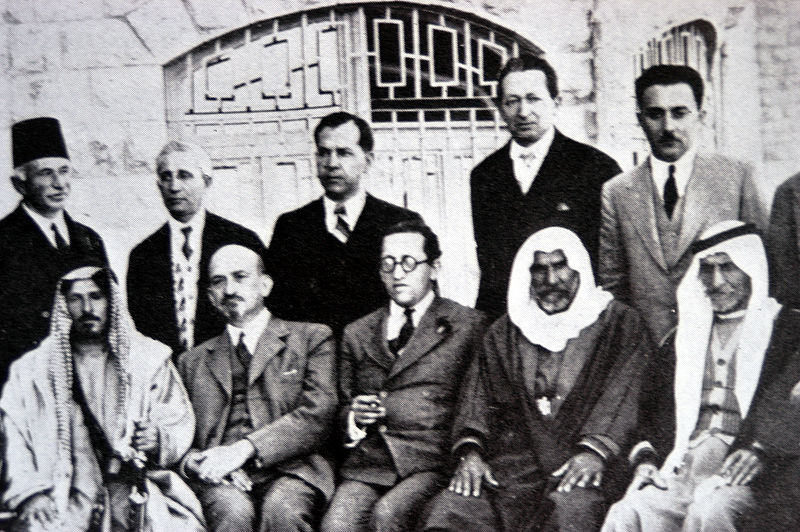<Back to Index>
- 2nd President of Israel Yitzhak Ben - Zvi, 1884
- Architect and City Planner Walter Burley Griffin, 1876
- Leader of the Mensheviks Julius Martov (Yuli Osipovich Zederbaum), 1873
PAGE SPONSOR


Yitzhak Ben-Zvi (24 November 1884 – 23 April 1963; Hebrew: יצחק בן צבי) was a historian, Labor Zionist leader, the second and longest serving President of Israel.
Born in Poltava in the Russian Empire (today in Ukraine), Ben-Zvi was the eldest son of Zvi Shimshelevich, who later took the name Shimshi. Shimshi was a leading Zionist activist and one of the organizers of the first Zionist Congress in 1897. In 1952, he was honored by the first Israeli Knesset with the title "Father of the State of Israel."
Ben-Zvi was active in the Jewish self defense units organized in Ukraine to defend Jews during the pogroms of 1905, and joined the Poale Zion Zionist political party. He was a representative in the Zionist Congress of 1907, and it was there that he first met Israel Shochat. Ben-Zvi emigrated to Palestine that same year, and settled in Jaffa. "Bar - Giora", the clandestine precursor to Hashomer, was created in his apartment in 1907. In 1909, he organized the Gymnasia Rehavia high school in Jerusalem together with Rachel Yanait.
Following his studies at Galatasaray High School in Constantinople, from 1912 to 1914 Ben-Zvi studied law at Istanbul University, together with the future Israeli prime minister David Ben - Gurion. They returned to Palestine in August 1914, but were expelled by the Ottoman authorities in 1915. The two of them moved to New York City, where they engaged in Zionist activities and founded the HeHalutz (Pioneer) movement there. Together, they also wrote the Yiddish book The Land of Israel Past and Present to promote the Zionist cause among American Jewry.
Upon returning to Palestine in 1918, Ben-Zvi married Yanait. They had two sons: Amram and Eli. Eli died in the Arab - Israeli War, defending his kibbutz, Beit Keshet.
Ben-Zvi served in the Jewish Legion together with Ben - Gurion. In 1919, he helped found the Ahdut HaAvoda party, and became increasingly active in the Haganah.
He was later elected to the Jerusalem City Council and president of the
National Council, the shadow government of the Jewish community in
Mandatory Palestine. According to a book published in 1985, Ben-Zvi
allegedly ordered the 1924 political assassination of Jacob Israël de Haan, who had turned into an anti - Zionist.
When Israel gained its independence, Ben-Zvi was among the signers of its Declaration of Independence on 14 May 1948. He served in the First and Second Knesset for the Mapai party. He was elected President of Israel on 8 December 1952, assumed office on 16 December 1952, and continued to serve in that position until his death.
Ben-Zvi believed that the president should set an example for the public and his home should reflect the austerity of the times. For over 26 years, he and his family lived in a wooden hut in the Rehavia neighborhood of Jerusalem. The State of Israel took interest in the adjacent house, built and owned by Nissim and Esther Valero, and purchased it, after Nissim's death, to provide additional space for the President's residence. Two larger wooden structures in the yard were used for official receptions.
In
1948, Ben-Zvi headed the Institute for the Study of Oriental Jewish
Communities in the Middle East, later named the Ben-Zvi Institute (Yad
Ben-Zvi) in his honor. The Ben-Zvi Institute occupies Nissim Valero's
house. His main field of research was the Jewish communities and sects of Asia and Africa, including the Samaritans and Karaites.
- In 1953, Ben-Zvi was awarded the Bialik Prize for Jewish thought.
In 2005, he was voted the 181st greatest Israeli of all time, in a poll by the Israeli news website Ynet to determine whom the general public considered the 200 Greatest Israelis.
Ben-Zvi's photo appears on 100 NIS bills.
Many streets and boulevards in Israel are named for him. In 2008,
Ben-Zvi's wooden hut was moved to Kibbutz Beit Keshet, which his son
helped to found, and the interior was restored with its original
furnishings. The Valero house in Rehavia neighborhood
was designated a historic building protected by law under municipal
plan 2097 for the preservation of historic sites.
Yitzhak Ben-Zvi's father, Zvi Shimshi (Shimshelevitz), was a leading Zionist activist in the 19th century. A member of the B'ne Moshe and Hoveve Zion movements in Ukraine, he was one of the organizers with Dr. Theodore Herzl of the first Zionist Congress in Basel, Switzerland, in the fall of 1897. At this Congress, the World Zionist Organization was founded, and the intention to re-establish a Jewish state was announced. Shimshi was the only organizer of the first Zionist Congress to live to see the birth of the modern State of Israel in 1948. On 10 December 1952, Zvi Shimshi was honored by the first Israeli Knesset (parliament) with the title, "Father of the State of Israel."
Yitzhak
Ben-Zvi's brother was the well known Jewish author, Aharon Ruveny, and
his brother - in - law was the Israeli archaeologist, Prof. Benjamin Mazar.

